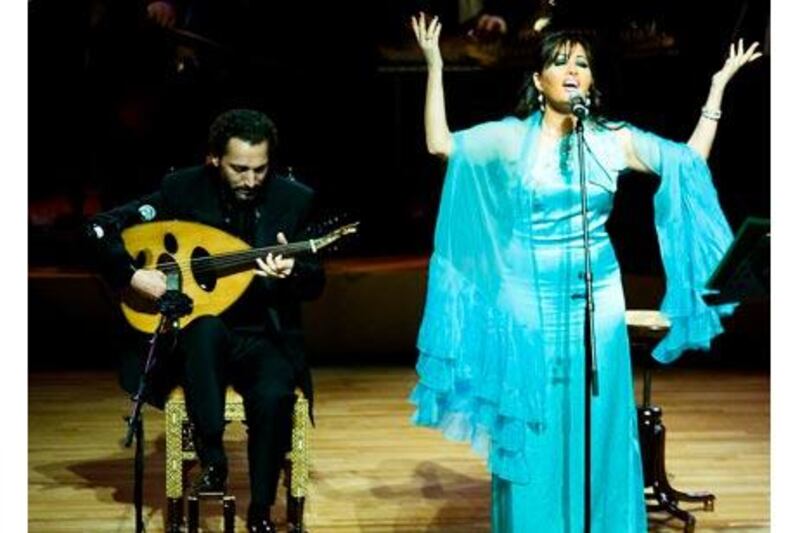As we approach the end of the sixth Abu Dhabi Music and Arts Festival, the audience's attention span shows no sign of waning. A "sold out" sign on the ADMAF website had hinted at healthy numbers for Latifa Sings Naseer Shamma, a collaboration between two of the Arab world's most prolific musicians. In fact, extra seating was brought in to accommodate the hordes who flocked to the Emirates Palace on Tuesday night.
This was, on the face of it, an unlikely duo: Latifa, a Tunisian former child prodigy famous for her spirited pop music - teaming with Shamma, an Iraqi musician known for his technical brilliance and academic approach to the oud, an instrument that he has even recreated with additional strings according to a ninth-century manuscript. Topped off with the Egyptian conductor Saeed Kamal and the mystically named Secret Orchestra, a group of Egypt's finest musicians hand-picked by Shamma, it had the makings of a heady night. It was Shamma who took centre stage for the first act. The oud virtuoso came on with a perfunctory bow before launching straight into Ala Ganah Farasha, a jauntily paced and rhythmically complex shot of adrenalin which pitched us headlong into a churning sea of swooning strings and marching percussion. It was a breathtaking opening, and one which elicited smiles of elation from most of the audience.
From there, we were lulled by the doom-laden strings of the opening bars of Ala Haffat al Alam, only to be lifted back up again by the twirling chorus of the oud. Thanks to such expert playing we were moved from misery to ecstasy in moments. Against a backdrop of swirling Arabic rhythms and bursts of woodwind and percussion, sounds were carefully layered, only to be separated out again into distinct parts.
The magnificent Secret Orchestra were dapper in slick suits and open-necked shirts, Kamal nonchalantly conducting them through a complex, undulating repertoire. All in black and bent over his oud, Shamma delivered several spine-tingling solos. Each piece was introduced with a short explanation. In Al Amriah, the final song of the first half of the concert, whirling strings and harrumphing brass built to a deafening crescendo before dropping off into the lone plucked string.
This abrupt finish was followed by a brief stunned silence before the audience erupted into applause and jumped from their seats for a standing ovation. He returned with Latifa for the second half, to accompany her through, bar one song, a set of his own compositions. A mermaid-like vision in aquamarine silk with glossy black locks flowing over her shoulders, she wafted to the front of the stage and smiled coyly at us. From now on, she was the star of the show, twirling her hands in time to the music before opening with Thonoon in a quavering alto. Her voice initially jarred a little against the simplicity of the oud. But, once into her stride, the heartfelt love song, Law Sahran Habibi, was a triumph of yearning and loss. Again, each piece was preceded with a brief introduction. Taht el Yasmenah, a lyrical tribute to the flowers of her homeland was followed by an abrupt change of mood in the finale, Ya Adowi, a scorching song in support of Palestine, for which she wore a scarf depicting the country's flag. It was an emotive performance but one which did not quite reach the level of feeling achieved in the first half.
All the while Shamma's remained present, duetting with Latifa at times and at others simply blending in with the orchestra. As the lights went down on a stage strewn with flowers, it was to a further standing ovation for a night of transcendental music.





